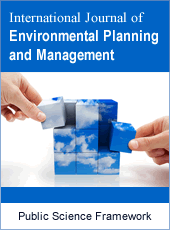International Journal of Environmental Planning and Management
Articles Information
International Journal of Environmental Planning and Management, Vol.4, No.1, Mar. 2018, Pub. Date: Jul. 20, 2018
Socioeconomic Factors in Recycling Waste as a Sustainable Practice in Malaysia
Pages: 1-6 Views: 2192 Downloads: 1524
[01]
Chiam Chooi Chea, Cluster of Business and Management, Open University Malaysia, Selangor, Malaysia.
[02]
Joshua Tan Juat Huan, School of Mathematical Science, Sunway University, Selangor, Malaysia.
Recycling and waste management is a vital step for a country to ensure the safety and the adequacy space of a country. Recent years, this issue has become a spotlight issues for all countries because if the waste is not separated properly, disorder will occur in landfills, resulting in toxic soup at the bottom, which can contaminate ground water and release explosive methane gas. This paper outlines the issues and challenges in recycling practices in Malaysia, since there is a serious problem of increasing rates of solid waste with corresponding inadequacy of landfills available. Evidence has shown that Malaysia has a low rate of recycling of waste as compared to developed countries. Furthermore, this paper gives an overview of recycling practices with several initiatives conducted by the Malaysian government apart from the socioeconomic factors for waste management in Malaysia. The results of this paper would be able to provide insights to the policy makers in introducing appropriate awareness campaign to the respective targeted group communities.
Recycling Practices, Waste Management, Socioeconomic
[01]
Atul Kumar & S. R. Sammader (2017). A review on technological options of waste to energy for effective management of municipal solid waste, Waste Management, vol. 69. p. 407-422
[02]
Barr, S., Gilg, A. W., and Ford, N. J. (2001). Differences between household waste reduction, reuse & recycling behaviour: a study of reported behaviours, intentions and explanatory variables. Journal of Environmental and Waste Management, 4 (2), 69-82.
[03]
Bratt, C. (1999). The impact of norms and assumed consequences on recycling behaviours. Journal of Environmental Behaviour, 31 (5), 630-656.
[04]
Christer, B. (2006). The assessment of household’s recycling costs: The role of personal motives. Journal of Ecological Economics, 56, 560-569.
[05]
Clarke, M. J. (1999). Introduction to waste prevention and recycling. Retrieved from http://www.geo.hunter.cuny.edu/~mclarke/Introductiontowastepreventionandrecycling.htm
[06]
De Young, R. (1986). Some psychological aspects of recycling. Journal of Environment and Behaviour, 18, 435 – 449.
[07]
Domina T, Koch K (2002). Convenience and frequency of recycling: implications forincluding textiles in curbside recycling programs. Environment and Behavior, 34: 216–38. Do Valle PO, Elizabeth
[08]
Elizabeth, J. & K. T. Chelvi. (2003). Cover story: Recycling makes slow progress. The Star News, October 2003.
[09]
Gonzalez-Torre PL, Adenso-Dıaz B, Ruiz-Torres A (2003). Some comparative factors regarding recycling collection systems in regions of the USA and Europe. Journal of Environmental Management, 69: 129–38.
[10]
Hansmann, R., Bernasconi, P., Smieszek, T., Loukopoulos, P. & Scholz, R. W. (2006). Justifications and self-organization as determinants of recycling behaviour: The case of used batteries. Journal of Resources, Conservation & Recycling 47, 133-159.
[11]
Helena Dahlbo, Valeria Poliakova, Ville Myllari, Olli Sahimaa & Reeta Anderson. (2017). Recycling potential of post-consumer plastic packaging waste in Finland. Waste Management vol 71. P 52-61
[12]
Hopper, J., & Nielsen, J. M. (1991). Recycling as altruistic behaviour: Normative and behavioural strategies to expand participation in a community recycling program. Journal of Environment and Behaviour, 23 (2), 195 - 220.
[13]
Hornik J, Cherian J, Madansky M, Narayana C. (1995). Determinants of recycling behavior: a synthesis of research results. Journal of Socio-Economics, 24: 105–27.
[14]
Kodwo Miezah, Kwasi Obiri Danso, Zsofia Kadddar, Bernard Fei-Baffoe & Moses Y. Mensah. (2015). Municipal Solid waste characterization and quantification as a measure towards effective waste management in Ghana, Waste Management, vol 46. p 15-27.
[15]
Meneses GD, Palacio A (2005). Recycling behavior: a multidi mensional approach. Environment and Behavior, 37: 837–60.
[16]
Ministry of Science, Technology and the Environment Malaysia (2011) http://www.epicos.com/EPCompanyProfileWeb/GeneralInformation.aspx?id=18484. Assessed 14 September 2014
[17]
Nyamwange, M. (1996). Public Perception of Strategies for Increasing Participation in Recycling Programs. The Journal of Environmental Education, 27 (4), 19-22.
[18]
Oskamp, S., Harrington, M. J., Edwards, T. C., Sherwood, D. L., Okuda, S. M. & Swanson, D. C., (1991). Factors influencing household recycling behaviour. Environment and Behaviour, 23 (4), 494 - 519.
[19]
Schultz, P. W., Oskamp, S., & Mainieri, T. (1995). Who Recycles and When? A Review of Personal and Situational Factors. Journal of Environmental Psychology, 15, 105-121.
[20]
Smeesters, D., Warlop, L., & Abeele, P. V. (2001). Between green words and green deeds: overview of results and practical implications. Lauven: Department Toegepaste Economische Watenschappen, Katholieke Universiteit Leuven.
[21]
S. Mehdi Emadian, Turgut T. Onay, Burak Demirel. (2017). Biodegradation of bioplastics in natural environments, Waste Management, vol. 59. p. 526-536.
[22]
The Star (2014), Govt to gradually introduce mandatory waste separation from Sept 2015. http://www.thestar.comy/News/Nation/2014/11/15/waste-sorting-mandatory-sept-2015/. Assessed 16 August 2015.
[23]
Vining. J & Ebreo A. (1990). What makes a recycler? A comparison of recyclers and nonrecyclers. Environment and Behavior, 22: 55–73.
[24]
Warner ME, Hefetz A. (2003). Rural–urban differences in privatization: limits to the competitive state. Environment and Planning C: Government and Policy 21 (5): 703–18.

ISSN Print: 2381-7240
ISSN Online: 2381-7259
Current Issue:
Vol. 7, Issue 4, December Submit a Manuscript Join Editorial Board Join Reviewer Team
ISSN Online: 2381-7259
Current Issue:
Vol. 7, Issue 4, December Submit a Manuscript Join Editorial Board Join Reviewer Team
| About This Journal |
| All Issues |
| Open Access |
| Indexing |
| Payment Information |
| Author Guidelines |
| Review Process |
| Publication Ethics |
| Editorial Board |
| Peer Reviewers |


